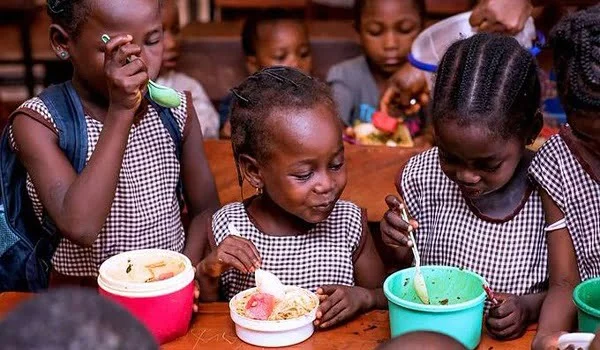The Federal Government has relaunched its school feeding initiative under a new banner; the Alternate Education and Renewed Hope National Home-Grown School Feeding Programme (NHGSFP) with an ambitious goal to reach 20 million vulnerable children across Nigeria by 2026.
Unveiled on Tuesday in Abuja, the initiative is a cornerstone of President Bola Tinubu’s renewed push for inclusive development as he marks his second year in office. The program is strategically aligned with Children’s Day and is being implemented through the National Social Investment Programme Agency (NSIPA) in collaboration with the National Commission for Almajiri and Out-of-School Children Education and the National Identity Management Commission (NIMC).
Speaking at the launch event, Minister of Humanitarian Affairs and Poverty Reduction, Professor Nentawe Yilwatda, described the project as both a social justice mission and a critical educational strategy aimed at reducing Nigeria’s staggering out-of-school population, one of the highest in the world.
“There is no better time to reaffirm our commitment to equitable and quality education for every Nigerian child, especially those who are excluded from the formal system,” Yilwatda declared. “This program is a lifeline; offering nutrition, education, identity, and dignity to the most underserved among us.”
The first rollout of the initiative takes place in Karsana II, a nomadic community in the Federal Capital Territory, where temporary learning facilities have been established for Primary One to Three pupils. Alongside classrooms, the government has constructed a staffroom and installed a solar-powered borehole to provide safe drinking water signaling a holistic approach that merges education, health, and welfare.
Each child enrolled in the program will receive a nutritious meal every school day, a core feature designed to encourage attendance, boost retention, and improve both mental and physical development.
Read also:
- FG increases inmate feeding allowance by 50% amid rising food costs
- FG to spend N999m daily on feeding 10m pupils
- Npower beneficiaries’ expectant as FG reopens NSIPA’s account
“This isn’t just about feeding or schooling; it’s about rebuilding hope, fostering inclusion, and empowering the next generation,” the minister added.
Also speaking at the event, Professor Badamasi Lawal, the National Coordinator and CEO of NSIPA, noted that the program, which started as a school nutrition scheme, has evolved into a major policy vehicle for tackling poverty and strengthening human capital.
“With this Alternate Education model, we’re reaching children in IDP camps, slums, informal settlements, and almajiri communities. This is not charity-it’s governance in action,” Lawal said.
The pilot phase targets 200 almajiri children in Karsana, serving as a testbed for nationwide expansion. According to Dr. Aderemi Adebowale, National Programme Manager of RH-NHGSFP, the initiative employs a community-driven model that integrates educational services from the Almajiri Commission and identity verification by NIMC.
“We’re not just focusing on children already in school; we’re going beyond the margins to bring back every child left behind,” she emphasized.
Dr. Nurudeen Zauro, Technical Advisor to the President on Economic and Financial Inclusion, reaffirmed the administration’s dedication to equity and inclusivity, noting that the program aligns with President Tinubu’s Renewed Hope Agenda aimed at tackling systemic poverty through education and empowerment.
Representing the House of Representatives, Deputy Chairman of the Committee on Poverty Alleviation, Alex Ikwechegh, praised the initiative as a landmark effort in the national fight against poverty and pledged full legislative support to ensure its long-term sustainability.
